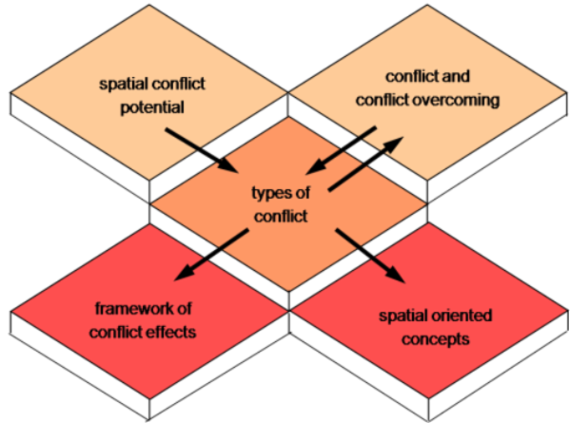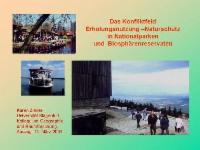Habilitation thesis
The Field of Conflict Recreational Use – Nature Conservation in National Parks and Biosphere Reserves
|
Source: Ziener 2003
Abstract
The present work rigorously draws the conflicts existing between recreational use and environmental protection in national parks and biosphere reserves into the foreground of its research. Its goal is to provide a model of the area of conflict – recreational use vs. nature conservation – in a region, which reduces this complexity and integrates various aspects of this conflict analysis. With a view towards implementing the results of the findings gained in this research for dealing with conflicts in national parks and biosphere reserves, the necessary cornerstones are laid for the formulation of a regional conflict strategy for the administration of protected areas which includes the potential conflicts as well as their effects with regard to future planning and management.
This activity is established in a crossover area of various scientific disciplines, and integrates aspects of regional and landscape oriented conflict perspectives with those from the social sciences to provide a unified depiction of the area of conflict – recreational use vs. nature conservation. On the one hand, the conflict potential resulting from landscape and utilisation aspects is a major aspect of the conflict between recreational use and nature conservation. On the other hand, conflict research, carried out in the field of the social sciences, provides approaches for interpretation and models for the perspectives, pertaining to the protagonists, in connection with managing and overcoming conflicts. The model is based on the integration of deductive derivations with inductive generalisations and, therefore, has a close relationship to conflict practice. Its modular construction permits the integration of various procedures, theoretical findings and methodical instruments. The depicted types of conflicts, used in structuring the area of conflict, characterise typical conflict situations between recreational use and conservation, the ways and means of overcoming them, as well as fundamental conflict effects. The relationships between effects within the area of conflict – recreational use vs. nature conservation – are portrayed as factual-spatial conflict hierarchies, as relationships between the conflicts resulting from spatial utilisation and goal conflicts, as well as on the micro-analytical area, through the experiences of those persons involved in the conflict.
The region forming both a landscape sector and an area of action, provides the suitable framework for the analysis of conflicts between recreational use and conservation and their relationship to the development of national parks and biosphere reserves. Substantial empirical work on the conflict situation and process in six differently-structured regions – the Spreewald, the Rügen island and Hiddensee island, the Harz and the Rhön (Germany), the Lake Neusiedl and the Danube floodplains in Vienna (Austria) – provides the basis for generalisations and an inductive achievement of knowledge.
publication of habilitation thesis
research regions
tourist questioning
Last update 8.6.2009

